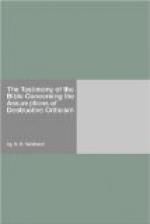First—Because of the change of style of composition from the thirty-ninth chapter to the close of the book.
Second—On the ground that the theme is more exalted than in the first thirty-nine chapters. Hence, it is assumed that these last chapters could not have been written by Isaiah.
Third—On the ground that Cyrus is mentioned by name, in the forty-fourth and forty-fifth chapters of the book, as the restorer of Jerusalem. Hence, our critics conclude that this part of the book must have been written after the event, as the prophet (it is assumed) could not name Cyrus before his birth.
Fourth—The critics assume that the prophet must prophesy out of his immediate surroundings, whatever that may mean. They furnish their troubled disciples the comforting assurance that these discoveries do not diminish the value of the book, but render it more accurate and interesting as a literary work. The professor already quoted, a fair representative of the critical school, in his recent lectures, referred to on a preceding page, distinguished the authors of the book as “Isaiah and the Great Unknown Prophet.” Other critics multiply, somewhat indefinitely, the number of “The Unknowns.” Our critic regards the change in style and theme from the thirty-ninth chapter to the end of the book as valid proof of at least the dual authorship of the book.
This assumption instantly raises the question as to who is the author of prophetic themes. Is it the prophet himself or the Holy Spirit? Does the prophet himself bring forth the prophecy of his own foreknowledge? Or, is the Holy Spirit the inspirer of themes new and old? Happily God has settled the question for us. He declares by his Apostle Peter “that no prophecy of Scripture is of any private interpretation”; that is, of the prophet’s own disclosure. “For prophecy came not of old time by the will of man; but holy men of God spake as they were moved by the Holy Spirit.” (2 Peter i. 20, 21.) It is, therefore, bold assumption to affirm that God could not give to the same prophet new and more exalted themes in his progressive revelation of truth. It is a limitation of God himself to the critic’s notion of what should, or should not be. This would eliminate the divine element of the book by a sweep of the critic’s pen. It is an assumption too groundless to need a reply.
Further, as to the change of style. Nothing is more natural or reasonable than the fact that a change of theme should produce a change of style. A more exalted theme must quicken the imagination, set the emotions aflame, stimulate all the mental and moral powers of the author. A historical statement, a commonplace theme, can be dealt with in a commonplace style, while new and uplifting truth awakens new powers in the writer. Milton’s Paradise Lost was entirely different from his ordinary prose composition. Dr. John Watson’s sermons were on a higher level than his books of fiction. Writers who do much of their literary work on the level plain on which the people move, frequently rise to mountain peaks of sublime composition when the occasion and theme demand it.




